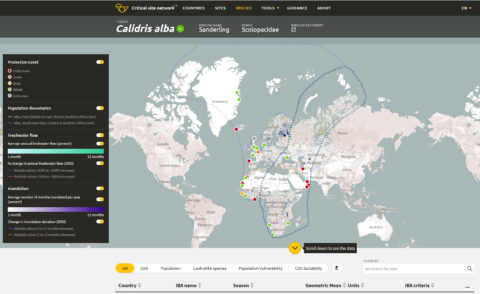
The Wings Over Wetlands (WOW) Project
The famous WOW project has provided a long-term flyway framework to promote conservation of migratory waterbirds and critically important wetlands in the African – Eurasian flyway region. In 2011, this project was selected by Global Environment Facility (GEF), as one of its top 20 environmental projects around the world through the United Nations Environment Program (UNEP).
The Wings Over Wetlands (WOW) Project was the first international, flyway-scale wetland and waterbird conservation initiative ever to take place in the African-Eurasian region. The four year project (2006 – 2010) was a partnership among international conservation organisations and national governments, which aimed to improve and conserve healthy and viable populations of African-Eurasian migratory waterbirds.The area covered by this initiative included all 118 range states of the UNEP administered African-Eurasian Migratory Waterbird Agreement (AEWA), covering all of Africa, all of Europe, south-west Asia (including the Middle East and Central Asian States), Greenland and the Canadian Archipelago.
Wings Over Wetlands was a joint effort between Wetlands International, BirdLife International UNEP/AEWA Secretariat and the Ramsar Convention. It was sponsored by the Global Environment Facility (GEF) through the UN Environment Programme (UNEP), the German Federal Ministry for Environment, Nature Conservation and Nuclear Safety (BMU), the Secretariat of the African-Eurasian Migratory Waterbird Agreement (UNEP/AEWA Secretariat) and several other donors and partners. The United Nations Office for Project Services (UNOPS) was engaged to support project implementation, and the project was implemented in close cooperation with the UNEP/AEWA Secretariat, the Ramsar Convention on Wetlands, UNEP-WCMC and with many local partners along the African-Eurasian flyways.
The three main components were:
- The WOW Critical Site Network (CSN) Tool
- The WOW Flyway Training Kit
- WOW Demonstration Projects
A new web portal was developed by the WOW technical team and is providing unprecedented access to information on over 300 migratory waterbird species, their migration routes and the key wetland sites these birds use in the African-Eurasian region. The Critical Sites Network (CSN) Tool developed during the project supports conservation efforts of countries along the entire Flyway by providing decision-makers and conservation organisations with the improved data access needed for timely and focused wetland and waterbird conservation. The Tool has since been updated in 2018.

A training and capacity development framework was developed in consultation with a wide range of partners across the region, which has helped enhance the professional capacity and understanding of flyway-scale conservation concepts among conservation professionals and decision makers at various levels across the AEWA region.

A FLYWAY TRAINING PROGRAMME with a comprehensive FLYWAY TRAINING KIT was developed, which includes tailor-made training materials on topics related to flyway conservation, wetland management and migratory waterbird conservation, targeted to a range of stakeholders in the African-Eurasian region. The Training Kit includes three modules with example-rich text, case studies and exercises and is supported by a comprehensive set of PowerPoint presentations, as well as accompanying CDs with a range of supporting material. It is designed to assist in targeted training that can be customised by topic as they relate to flyway conservation, wetland management and migratory waterbird conservation. The Kit is available in Arabic, English, French and Russian.
The project also supported field demonstration projects in eleven important wetland areas in Estonia, Hungary, Lithuania, Mauritania, Niger, Nigeria, Senegal / The Gambia, South Africa, Tanzania, Turkey and Yemen. These projects focused on a number of wetland-related conservation issues including community mobilisation, management planning, ecotourism, field research, wetland restoration, control of invasive species, trans-boundary management, education and alternative livelihoods.
WOW Partners and platforms: Global Environment Facility, UN Environment, Wetlands International, BirdLife International, African- Eurasian Waterbird Agreement, UNOPS, Ramsar Convention, and UNEP WCMC.
The WoW project has provided the basis for a new project “Climate-resilient Flyways” to ensure that this network of wetlands across the region remains complete and climate resilient.
Contact person:
Dr. Taej Mundkur [email protected]
